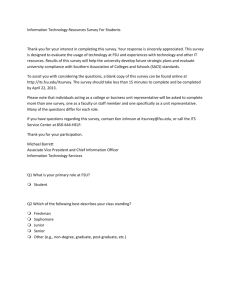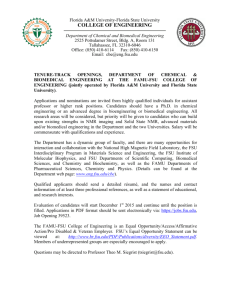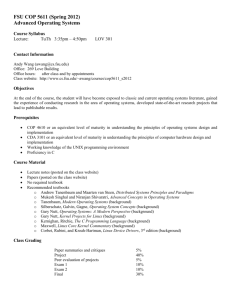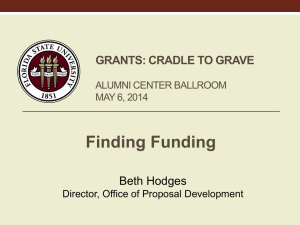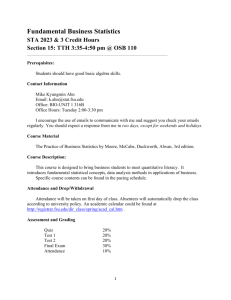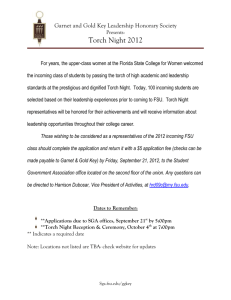Sociology of Marriage and Family (SYP2430: 0105)
advertisement
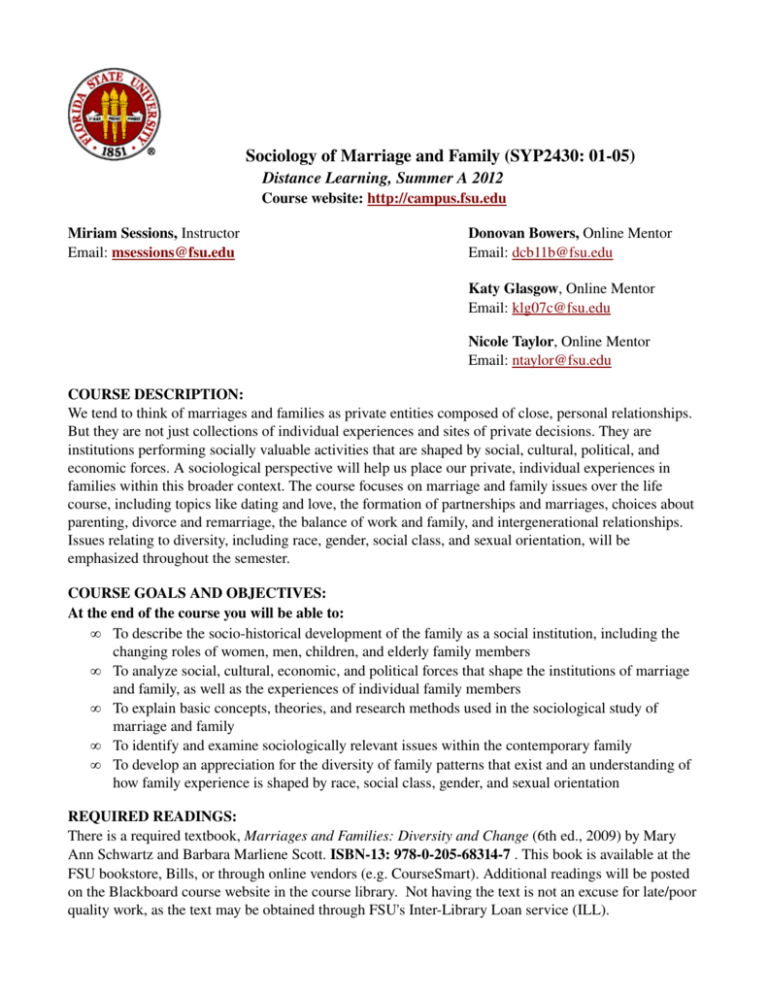
Sociology of Marriage and Family (SYP2430: 01­05) Distance Learning, Summer A 2012 Course website: http://campus.fsu.edu Miriam Sessions, Instructor Email: msessions@fsu.edu Donovan Bowers, Online Mentor Email: dcb11b@fsu.edu Katy Glasgow, Online Mentor Email: klg07c@fsu.edu Nicole Taylor, Online Mentor Email: ntaylor@fsu.edu COURSE DESCRIPTION: We tend to think of marriages and families as private entities composed of close, personal relationships. But they are not just collections of individual experiences and sites of private decisions. They are institutions performing socially valuable activities that are shaped by social, cultural, political, and economic forces. A sociological perspective will help us place our private, individual experiences in families within this broader context. The course focuses on marriage and family issues over the life course, including topics like dating and love, the formation of partnerships and marriages, choices about parenting, divorce and remarriage, the balance of work and family, and intergenerational relationships. Issues relating to diversity, including race, gender, social class, and sexual orientation, will be emphasized throughout the semester. COURSE GOALS AND OBJECTIVES: At the end of the course you will be able to: • To describe the socio­historical development of the family as a social institution, including the changing roles of women, men, children, and elderly family members • To analyze social, cultural, economic, and political forces that shape the institutions of marriage and family, as well as the experiences of individual family members • To explain basic concepts, theories, and research methods used in the sociological study of marriage and family • To identify and examine sociologically relevant issues within the contemporary family • To develop an appreciation for the diversity of family patterns that exist and an understanding of how family experience is shaped by race, social class, gender, and sexual orientation REQUIRED READINGS: There is a required textbook, Marriages and Families: Diversity and Change (6th ed., 2009) by Mary Ann Schwartz and Barbara Marliene Scott. ISBN­13: 978­0­205­68314­7 . This book is available at the FSU bookstore, Bills, or through online vendors (e.g. CourseSmart). Additional readings will be posted on the Blackboard course website in the course library. Not having the text is not an excuse for late/poor quality work, as the text may be obtained through FSU's Inter­Library Loan service (ILL). BLACKBOARD: The blackboard course website will allow for fast communication between class members. Please visit blackboard and monitor your FSU email account regularly for course announcements. The most effective way to contact me is through e­mail (msessions @fsu.edu ). I regularly check my e­mail throughout the day and will respond to emails as soon as possible, and often within 24 hours (M­F). SOFTWARE REQUIREMENTS: You must be able to access the internet, read PDF documents, view streaming audio and video, as well as use basic word processing and spreadsheets. If you do not have a high­speed internet connection at home you need to set aside time in your schedule to access the online material from a computer with a sufficient connection speed. Slow connection speeds at home are not a valid excuse for failing to complete a course requirement on time. COURSE REQUIREMENTS: Mandatory First Day Attendance: Florida State University has a mandatory first day attendance requirement (absent students will be dropped). In order to fulfill this requirement for the online class, you must log into the course website and complete your online bio and syllabus quiz. You'll be asked to introduce yourself to your classmates by posting a short bio on the course website. Also, you’re required to read this syllabus in detail, and will be quizzed on the details regarding its content. Discussion Boards: We' will have 5 online discussions over the course of the semester. Your first posting should be 200 words and include the relevant use of sociological concepts and supporting scholarly evidence. It should also use good grammar. In addition to the original comment, each student must make a reasoned reply or reaction to at least one posting during each class discussion. Response posts should be at least 75 words in length. Original posts must be time­stamped before 11:55pm Wednesday to receive credit, and reply posts must be completed by Friday at 11:55pm. Quizzes: The 6 quizzes will cover material from the chapters indicated on the course calendar. Family Interview Project: For this project, you’ll focus on a topic related to families (e.g., gender roles; managing dual career families; single­parent families) and write a paper (about 4­5 pages double­spaced) incorporating concepts you’ve learned in the class. You may interview members from your own or another family. I’ll provide more details about the project several weeks before the paper will be due. Final Exam: There will be a cumulative final exam for this course, please see the course schedule for further details. GRADING/EVALUATION: Course grades will be based on the following weighting of course requirements: Family Interview Paper 20% Final Exam 15% Discussion Boards 30% (6 points each) First Day Attendance (quiz and bio) 5% (3 and 2 points, respectively) Quizzes 30% (5 points each) Total 100% (100 points) Grading will be according to a standard scale, and plus/minus grading will be used for final semester grades. FSU does not allow a final grade of “A+.” Specific grade ranges: A =93­100 C=73­76 A­ =90­92 C­ =70­72 B+ =87­89 D+=67­69 B=83­86 D=63­66 B­ =80­82 D­ =60­62 C+ = 77­79 F=<59 COURSE POLICIES: Submitting Assignments: Upload your work by using the link provided on each assignment. Do NOT send your work to us via email. Be sure to include your name (Last name, First initial) and FSU email address inside the text of all assignments that you submit. You will receive assignment grades and feedback privately by email and/or be able to check your grade in the course grade book. We will return assignments to the grade book. You will be able to access them through “Student tools.” Be sure to carefully review instructor and mentor feedback on your assignments. Please keep a copy of all your work. We cannot assume responsibility for lost items. Contact Expectations: When contacting me or your mentor via email please be sure that you have constructed a professional email that has 1) an appropriate subject title that summarizes your email, 2) has been proof read for clarity (grammar and spell check), 3) gives specifics (eg. dates, page numbers, assignments) pertaining to your message content and 4) is signed with your full name. Please specify who the intended recipient of your email is. It can be unclear who the intended recipient is (instructor, mentors, other students) when using the email option through the course website. If you do not specify that we are the intended recipient, we may not reply. Before emailing us with questions please refer to the syllabus, often when students have questions the answers can be found in the course guide. Who to Contact with Questions: If you have a question about your mini­test grades, a make­up assignment or a documented excused absence please contact the instructor, Ms. Sessions. If you have questions regarding your discussion board or paper grades, please contact your group's online mentor: Donovan, Katy or Nicole. Student Conduct Code: Everyone in this class is expected to adhere to principles embodied in the FSU Student Conduct Code. This code essentially requires everyone to maintain the highest professional standards of conduct in class. Violation of the conduct code carries a range of penalties that can range from a reduced grade to expulsion. Website: http://www.fsu.edu/Books/Student­ Handbook/2003codes/conduct.html. Academic Honor Policy: Students are expected to abide by the Academic Honor Policy of the Florida State University, including the statement on Values and Moral Standards published in The Florida State University General Bulletin. The Academic Honor Policy outlines the University's expectations for students' academic work, the procedures for resolving alleged violations of these expectations, and the rights and responsibilities of students and faculty throughout the process. Please see this site for a complete explanation of the Academic Honor Policy: http://www.fsu.edu/~dof/honorpolicy.htm Academic Dishonesty: Students must abide by the highest standards of academic integrity. Any form of academic dishonesty will result in an “F” for that particular assignment or in the course, at the instructor’s discretion. Any student who plagiarizes, cheats on exams, or otherwise behaves in a dishonest way may be reported to the university administration for further disciplinary action as specified in the Academic Honor Policy. Website: http://www.fsu.edu/~dof/forms/honorpolicy.pdf Americans with Disabilities Act Statement: Students with disabilities needing academic accommodation should do the following: (1) register with and provide documentation to the Student Disability Resource Center; (2) bring a letter to the instructor indicating the need for accommodation and what type. This must be done during the first week of class. For more information about services available to FSU students with disabilities, contact: Student Disability Resource Center, 108 Student Services Bldg., Florida State University Tallahassee, FL 32306­4167, (850)644­9566 (voice), (850)644­8504 (TDD) E­mail: SDRC@admin.fsu.edu Website: http://www.fsu.edu/~staffair/dean/StudentDisability/ Excused Absences and Late Work: In order to be granted an excused absence and to submit late work, students must meet three requirements. First, the absence must be a legitimate and excusable absence. The following and only the following absences are eligible to be excused: Religious holidays, as specified in FSU policy; absences due to representing FSU at official functions, including intercollegiate debating or varsity sports events; verified emergencies and/or medical illness. Medical illness refers to conditions that are serious in nature and require treatment by medical professionals and/or surgical or other treatments. Second, supporting documentation must be provided that excuses the absence. This documentation must provide a date excusing the time­period the students work was due, and must be provided from a credible source (e.g. a medical professional, a published obituary, etc.). Finally, documentation must be provided to excuse the absence no later than two weeks from the absence period. Incomplete Grades: Missing work or uncompleted assignments are insufficient reasons for a grade of Incomplete. An Incomplete grade will not be given except under extenuating circumstances at the instructor’s discretion. Note that College of Social Science guidelines require that students seeking an “I” must be passing the course. Amendment to Incomplete Grades: Your mental health is important to me. With that said, I am not qualified to handle many (if any) mental health issues. I am, however, human. Please let me know if you are overwhelmed in this course. I cannot change the requirements, as that would not be fair to your fellow classmates, but I can direct you to outside people that may be able to assist you. These people include tutors, school therapists, the writing center staff, librarians, and other useful people to know. I want this course to be a pleasant experience for all of us. Please talk to me if you need any kind of guidance or help. We all do at times. University Counseling Center: counseling.fsu.edu; (850) 644­2003. Syllabus change policy. This syllabus is a guide for the course and is subject to change with advanced notice. It and other class materials are available in alternative format upon request. TECHNICAL ISSUES: If you have problems or questions concerning your computer equipment, software, Internet connection, or the course website, follow the procedures described below: • If you have a technical question and are not able to connect to the Internet: Call the ACNS Help Desk at 1­850­644­8502, option 1. • If you have a technical question and are able to connect to the Internet: Check out the Online Support website at: http://online.fsu.edu/onlinesupport • You may go directly to the Student Handbook for Online Learning, which provides step­by­step instructions on using the course website as well as technical contacts. It is available online at: http://www.fsu.edu/~distance/media/studenthandbook.pdf • If your question or problem is not addressed by the websites listed above, then send an e­mail to: problems@campus.fsu.edu TENTATIVE COURSE SCHEDULE Week Dates 1 5/14 ­ 5/18 2 3 4 5/21 ­ 5/25 5/28* ­ 6/1 *No class, Memorial Day 6/4 ­ 6/8 Topics and Assigned Reading Assignments Marriages and Families over Time, Chapter 1 (pg. 1­28) AND Ways of Studying and Explaining Marriages and Families, Chapter 2 (pg. 29­40) Bio and Syllabus Quiz Ways of Studying and Explaining Marriages and Families, Chapter 2 (pg. 40­55) AND Understanding Gender: Its Influence on Intimate Relationships, Chapter 3 (pg. 56­80) Discussion Board 1 The Many Faces of Love, Chapter 4 (pg. 81­109) Quiz Two due Wed. 11:55pm EST Quiz One due Fri. 11:55pm EST 1st post due Wed. 11:55pm 2nd post due Fri. 11:55pm due Fri. 11:55pm EST Dating, Coupling and Mate Selection, Chapter 5 (pg. . 110­146) Discussion Board 2 1st post due Wed. 11:55pm 2nd post due Fri. 11:55pm 5 6/11 ­ 6/15 Sexuality and Intimate Relationships, Chapter 6 (pg. 147­186) Quiz Three due Fri. 11:55pm EST 6 7 8 9 10 6/18 ­ 6/22 6/25 ­ 6/29 7/2 – 7/6* No class July 4th,, Independence day 7/9 ­ 7/13 7/16 ­ 7/20 Living Single, Living with Others: Nonmarital Lifestyles, Chapter 7 (pg. 187­210) AND The Marriage Experience, Chapter 8 (pg. 211­232) Discussion Board 3 The Marriage Experience, Chapter 8 (pg. 233­248) AND Reproduction and Parenting, Chapter 9 (pg. 249­286) Quiz Four Evolving Work and Family Structures, Chapter 10 (pg. 287­315) Discussion Board 4 1st post due Wed. 11:55pm 2nd post due Fri. 11:55pm due Fri. 11:55pm EST 1st post due Thurs. 11:55pm* 2nd post due Fri. 11:55pm The Process of Uncoupling: Divorce in the United States, Chapter 12 (pg. 350­376) Quiz Five due Fri. 11:55pm EST Power, Abuse and Violence in Intimate Relationships, Chapter 11 (pg. Discussion Board 5 1st post due Wed. 11:55pm 316­349) 2nd post due Fri. 11:55pm 11 12 7/23 ­ 7/27 7/30­ 8/3 Remarriage and Remarried Families, Chapter 13 (pg. 377­400) Quiz Six Marriages and Families in Later Life, Chapter 14 (pg. 401­426) Family Interview Paper due Fri. 11:55pm EST due Wednesday 11:55pm 13 8/6 ­ 8/10 FINALS WEEK Final Exam due Friday 11:55pm
